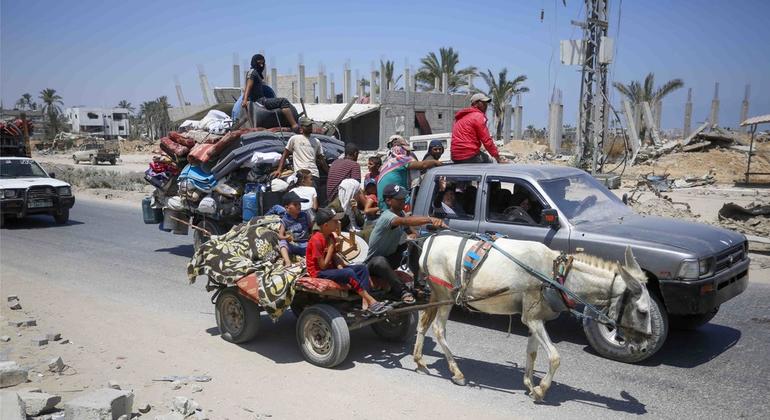The recent developments in Gaza have shed light on the ongoing humanitarian crisis in the region. Media reports have indicated that talks for a truce and hostage swap in Doha, Qatar have been postponed until early next week. This delay comes at a critical time when 116 hostages are still missing, with 44 believed to have died, following Hamas-led terror attacks on multiple targets in southern Israel nearly 10 months ago. These attacks resulted in around 1,250 deaths and over 250 people taken captive.
In a recent report by the UN aid coordination office, OCHA, a bleak assessment of hunger levels in Gaza was highlighted. The report warned of the inadequate relief reaching those in need due to insecurity, damaged roads, breakdown of law and order, and access limitations along the main humanitarian cargo route between Kerem Shalom Crossing and Khan Younis and Deir al Balah. These challenges have hindered the delivery of essential supplies to the most vulnerable populations in Gaza.
OCHA also pointed out the critical shortages impacting community kitchens in northern Gaza. Insufficient deliveries of fuel and aid supplies from central/southern Gaza to the north have left six bakeries in northern Gaza receiving only scarce quantities, leading to the risk of spoilage and infestation of food supplies. The lack of protein sources such as meat and poultry in the local market has further exacerbated the food insecurity in the region.
The report highlighted the inadequate production capacity of hot meals to support the tens of thousands of newly displaced people in Gaza. The lack of entry of commercial supplies into northern Gaza has resulted in a near-total absence of essential agricultural inputs, hindering the restoration of local food production. The ongoing Israeli military operations in Rafah and the exodus from eastern Khan Younis have further disrupted agricultural activities in the region, potentially devastating people’s livelihoods.
The impact of missing the upcoming agricultural season could have far-reaching consequences for the people of Gaza. The UN Food and Agriculture Organization (FAO) has emphasized that agriculture in the Gaza Strip represents over 40% of the enclave’s surface area and contributes up to 30% of daily consumption. The extensive damage to the agricultural sector due to hostilities has brought crucial local production of fresh and nutritious food to a near-total halt, further exacerbating the food crisis in Gaza.
The humanitarian situation in Gaza is dire, with ongoing conflicts and access restrictions impeding the delivery of essential supplies to those in need. The lack of protein sources, critical shortages of commodities, and the devastation of agricultural lands pose significant challenges to addressing food insecurity in the region. As talks for a truce and hostage swap continue to be postponed, the plight of the people in Gaza remains a pressing concern that requires immediate attention and action from the international community.









